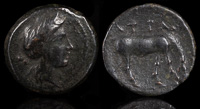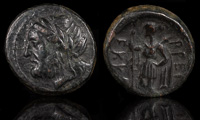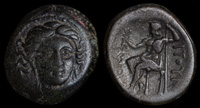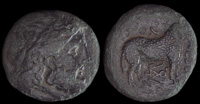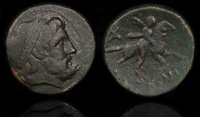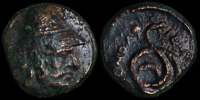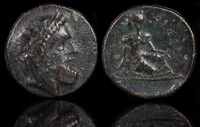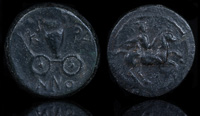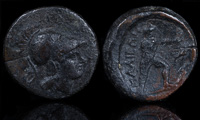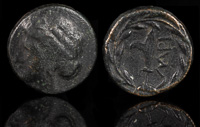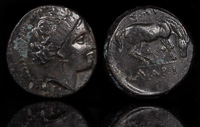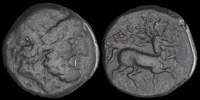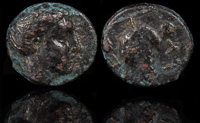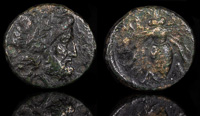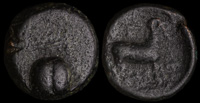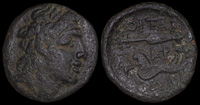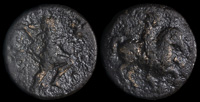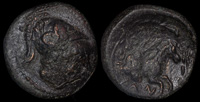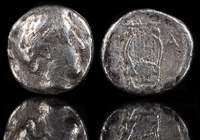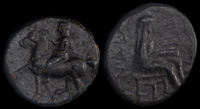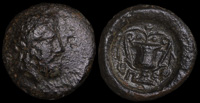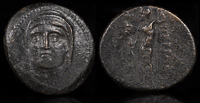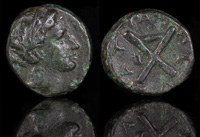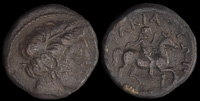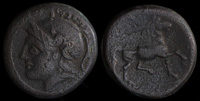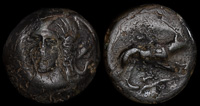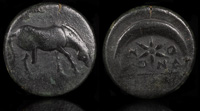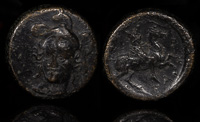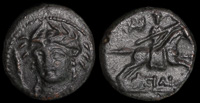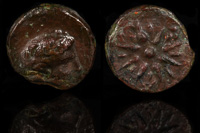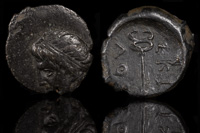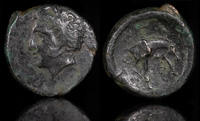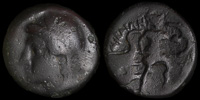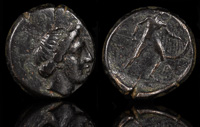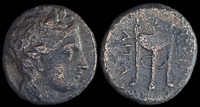Thessaly
The fleet of Xerxes I is hit by a storm and badly damaged near Skiathos.
Herakleia Trachineia founded by Spartan settlers.
The Spartan general Brasidas captures Amphipolis and then Galepsos. He travels through Melitaia and camps at Phakion.
Birth of Meno, who helped lead the 10,000 with Xenophon, in Larissa.
The inhabitants of Herakleia Trachineia are slaughtered by their neighbors.
Spartans again repopulate Herakleia Trachineia.
Seven hundred soldiers from Herakleia Trachineia are slaughtered in a battle with their neighbors.
Herippidas of Sparta puts to death all anti-Spartans at Herakleia Trachineia and expels foreigners.
Thebes takes Herakleia Trachineia from Sparta and installs the Trachinians and Oetaians.
Amyntas III recovers Macedon with the help of Thessaly and particularly Larissa.
Death of the philosopher Gorgias of Leontini in Larissa.
Jason becomes dictator of Pherai.
Jason of Pherai destroys the walls of Herakleia Trachineia to ease passage into the rest of Greece.
Death of the famous physician Hippokrates in Larissa.
Jason of Pherai is assassinated. His brothers Polydoros and Polyphron succeed him as kings.
Alexander of Pherai murders his uncle Polyphron and takes the throne of Pherai.
Alexander II intervenes in Thessaly to support the city of Larissa against the tyrant Alexander of Pherae.
Alexander of Pherai massacres the inhabitants of Skotussa.
With Theban power down after the death of Epaminondas, Alexander of Pherai takes Tinos and sells the inhabitants as slaves, then besieges Peparethos. Athens defeats Alexander near Sounion and relieves Peparethos. Alexander then plunders Piraios.
Lysimachos is born in Krannon or Pella.
Alexander of Pherai is murdered by the brothers of his wife Thebe, Teisiphon, Lykophron and Peitholaos at Pherai.
Alexander III travels through Pelinna on his way to Thebes.
326 BCE
Antipater barricaded in Herakleia Trachineia by Athens during the Lamian War.
Antipater and Krateros defeat Athens and the Aetolian League at the Battle of Krannon.
Athens and the Aetolian League leave their baggage at Melitaia before attacking Leonnatos.
Demetrios Poliorketes occupies Larissa Kremaste while at war with Kassander.
Polyperchon issues a decree to restore democratic governments in all cities to reduce the allure of Kassander. Those exiled due to this may return, with the exception of Amphissa, Pharkadon, Herakleia Pontika, Trikka, and Megalopolis.
Demetrios Poliorketes pushes Kassander out of Athens and chases him to Herakleia Trachineia, who submit to him.
Halos is refounded by Demetrios Poliorketes.
Demetrios Poliorketes captures Larissa.
Thebai serves as a stronghold of Kassander against Demetrios Poliorketes.
Demetrias founded by Demetrios I Poliorketes, who moved the inhabitants of Neleia, Pagasai, Ormenion, Rhizos, Sepias, Olizon, Boebe, and Iolkos to create it.
The Aetolian League obtains Herakleia Trachineia, giving them control over the pass of Thermopylae.
Philip V spends the summer at Larissa.
Larissa Kremaste taken by Lucius Apustius.
Troops the Athamanes and the Aetolian League camp near Pharkadon, but are attacked by troops of Philip V and pushed away.
The Romans under T. Quinctius Flamininus besieges Atrax, but fail to take it.
After the Romans take Phaloria, Kierion and Metropolis surrender their cities and are not attacked.
The Aetolian League attempt to take Metropolis after Philip V retreats, but they are repulsed.
The Aetolian League aids Rome in defeating Philip V in the Battle of Cynoscephalae. Philip pauses for a day at Gonnos for troops who had survived the battle. Several hundred soldiers from Gortyna participate on the Roman side.
The Romans declare Peparethos a free city.
Titus Quinctius Flamininus unsuccessfully attempts to take Thebai.
The Romans seize Demetrias and put a garrison in the town.
Larissa becomes the headquarters of the Thessalian League.
Metropolis and Kierion are taken by Antiochos III in the Roman-Seleukid War.
Antiochos III takes Atrax, by then a Roman stronghold, and Medeion.
Aetolians are besieged in Herakleia Trachineia by Acilius Glabrio. After 21 days the town is taken.
Metropolis and Kierion agains surrender their cities to the Romans, this time under Manius Acilius Glabrio.
Marcus Baebius Tamphilus takes Phakion.
The Romans under Manius Acilius Glabrio sack Lamia.
June 22
Julius Caesar, having been repulsed at Dyrrhachion, arrives at Gomphoi but they bar their gates. He takes the city by force.
August 9
Julius Caesar defeats Pompey decisively at the Battle of Pharsalos.
Peparethos is gifted by Marc Antony to Athens.

